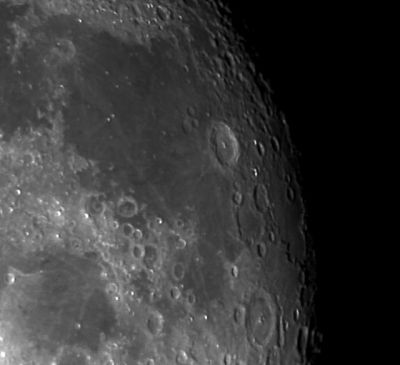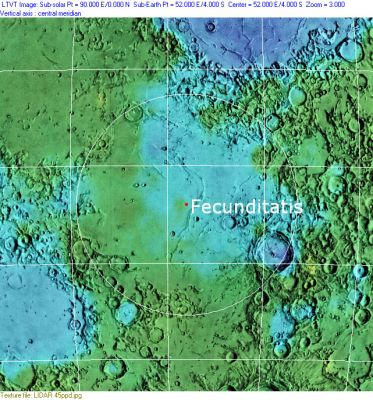Mare Fecunditatis
Contents
Fecunditatis Basin
(unofficial name; IAU feature name for central 909 km of mare: Mare Fecunditatis, formerly Mare Foecunditatis )
|
Lat: 7.8°S, Long: 51.3°E, Main ring diam: 690 km, Basin depth: 1.84 km, Rükl: 48 |


Left: Eric Soucy, Right: Clementine, Clementine LIDAR Altimeter texture from PDS Map-a-Planet remapped to north-up aerial view by LTVT. The dot is the center position and the white circle the main ring position from Chuck Wood's Impact Basin Database. Grid spacing = 10 degrees.
Table of Contents
[#Fecunditatis Basin Fecunditatis Basin]
[#Fecunditatis Basin-Images Images]
[#Fecunditatis Basin-Maps Maps]
[#Fecunditatis Basin-Basin Classification Basin Classification]
[#Fecunditatis Basin-Description Description]
[#Fecunditatis Basin-Description: Wikipedia Description: Wikipedia]
[#Fecunditatis Basin-Additional Information Additional Information]
[#Fecunditatis Basin-Nomenclature Nomenclature]
[#Fecunditatis Basin-LPOD Articles LPOD Articles]
[#Fecunditatis Basin-LROC Articles LROC Articles]
[#Fecunditatis Basin-Bibliography Bibliography]
Images
LPOD Photo Gallery Lunar Orbiter Images Apollo Images
Maps
(LAC zone 80A4) LAC map Geologic map LTO map
Basin Classification
(description of terms and most numeric basin data from Wood, C.A. (2004) Impact Basin Database)
| Certainty of Existence |
USGS Age |
Wilhelms Age Group |
Ring Diameters |
Mare Thickness |
Mascon |
| Uncertain |
Pre-Nectarian |
3 |
690, 990 km |
No |
Description
Description: Wikipedia
Additional Information
- 1970, Sept.: Luna 16 - first automated sample return, from Mare Fecunditatis
- Mare area of 220,000 km^2 according to measurements by Jim Whitford-Stark.
Nomenclature
- Called Mare Langrenianum by the father of selenography Michel Florent Van Langren (aka Langrenus).
- Called Mare Caspium by Johann Hewelcke (aka Hevelius).
- Called Mare Fecunditatis (or Mare Foecunditatis) by Giovanni Baptista Riccioli.
- The IAU feature name (Mare Fecunditatis) means "Sea of Fecundity" (or Fertility / Fruitfulness).
- The impact basin is named after the mare.
- The craters Taruntius G (Anville), Taruntius H, Taruntius K, and Taruntius P (all of them in the north-northwestern part of Mare Fecunditatis) were frequently photographed during several missions of the Apollo program. All four craters together look like some sort of "Constellation", or rather a "Constellation of Four" (thus nicknamed by Danny Caes, who's investigating all orbital Apollo photographs of these four craters, see page Anville).
LPOD Articles
Fecund Questions A Shallow Sea of Lava North-western surface Basin and lava Mare ridges Rays
LROC Articles
Mare Pit Topography! (Skylight in Mare Fecunditatis, unofficially called the Central Mare Fecunditatis Pit).
Bibliography
Rajmon, D & P Spudis (2000) Geology and Stratigraphy of Mare Fecunditatis. Lunar & Planetary Science 31, 1913.
This page has been edited 1 times. The last modification was made by - tychocrater tychocrater on Jun 13, 2009 3:24 pm - afx3u2